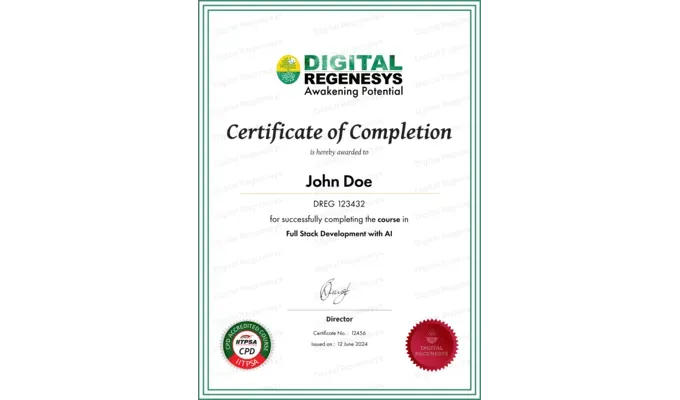Real-World Projects
Apply frontend and backend concepts through hands-on projects that reflect real-world web and software development scenarios.
HOURS OF LEARNING
TOOLS & LANGUAGES
SESSIONS
CPD POINTS













Apply frontend and backend concepts through hands-on projects that reflect real-world web and software development scenarios.
Build, document, and deploy multiple full-stack applications to GitHub as proof of practical development skills.
Progress from frontend fundamentals to backend development and full-stack application integration using modern frameworks.
Deploy web applications using platforms such as Vercel, Netlify, Render, and MongoDB Atlas.
Follow a step-by-step learning path designed for beginners, progressing from frontend to full-stack development.
Gain hands-on experience with tools such as React, Node.js, Express, MongoDB, Git, and Postman.
Prepare for professional roles with guidance on resumes, LinkedIn profiles, GitHub portfolios, and mock interviews.
Build a final full-stack application with authentication, user roles, dashboards, and end-to-end functionality.
At Digital Regenesys, we focus on delivering learning experiences that are practical, accessible, and built for modern professionals.

Structured to support learners with no prior programming or web development experience.

Revisit course materials, session recordings, and learning resources anytime for up to three years.

Receive dedicated assistance for queries, assignments, and practical full-stack projects throughout the course.

IITPSA Accredited certification validating skills in full-stack web and software development.

Apply your learning through practical, real-world full-stack application projects.

Engage with a diverse learner community and build connections with fellow developers and industry professionals.
The Full Stack Development with AI Certificate Course by Digital Regenesys equips learners with practical, AI-enabled skills to build modern web and software applications. This certification validates expertise in frontend and backend development, application integration, and AI-assisted development workflows. It prepares learners to design, build, and deploy real-world applications with confidence. The course is IITPSA-accredited and awards 30 CPD points, strengthening professional credibility.

Use AI coding tools globally
For a full-stack developer (Jan 2026)
Global software market by 2032
Firms Prefer Full-Stack Devs
See where Cybersecurity skills can take you in the current job market
Thabiso Ngcobo
Software Developer
The Full Stack Development course at Digital Regenesys was well-structured and practical. The curriculum covered both front-end and back-end technologies in depth, and the facilitators explained complex concepts in a simple, easy-to-understand way. The flexible class timings made it easy to balance learning with my sch...
Mcanthony Nyathi
Full Stack Developer
Full Stack Development course at Digital Regenesys exceeded my expectations. The lessons were practical, well-structured, and focused on real-world development skills. The facilitators were knowledgeable, supportive, and always punctual. I especially appreciated the flexible class timings, which made it easy to learn w...
Sadiq Mohammed
IT Professional
Full Stack Development course at Digital Regenesys was an excellent learning experience. The curriculum is up to date and covers both front-end and back-end technologies in a clear and practical way. The facilitators are highly experienced, supportive, and always punctual. The flexible class schedule and hands-on proje...
Cynthia Ponera
Application Developer
The lessons were clear and practical, and the facilitators were supportive and always on time. I really appreciated the flexible class timings, which made learning easy and stress-free. Course at Digital Regenesys was a great experience
The Full Stack Development course at Digital Regenesys was well-structured and practical. The curriculum covered both front-end and back-end technologies in depth, and the facilitators explained complex concepts in a simple, easy-to-understand way. The flexible class timings made it easy to balance learning with my sch...
Software Developer
Full Stack Development course at Digital Regenesys exceeded my expectations. The lessons were practical, well-structured, and focused on real-world development skills. The facilitators were knowledgeable, supportive, and always punctual. I especially appreciated the flexible class timings, which made it easy to learn w...
Full Stack Developer
Including taxes